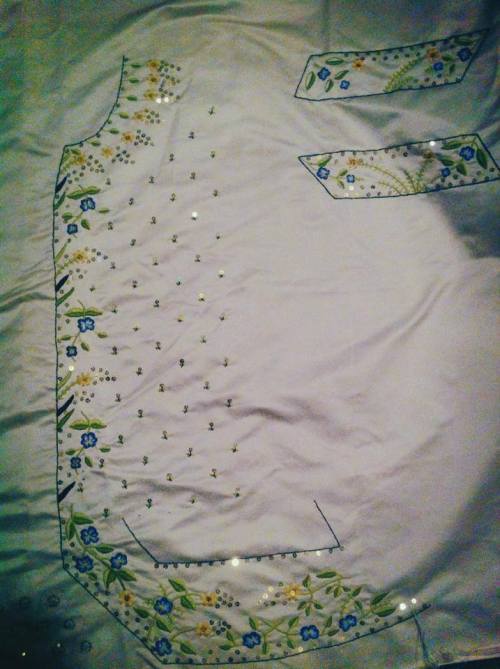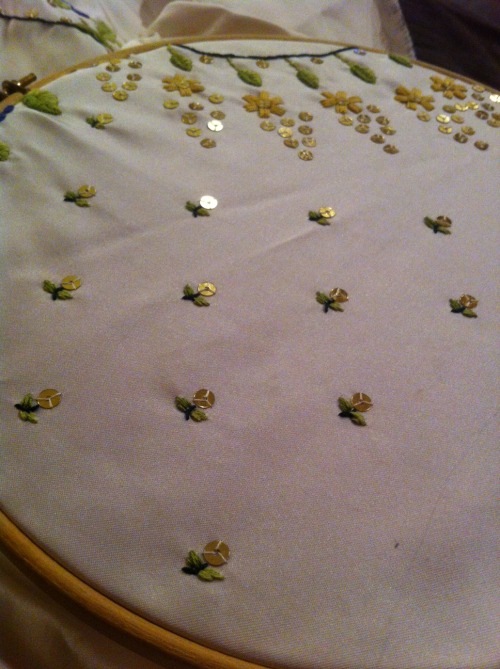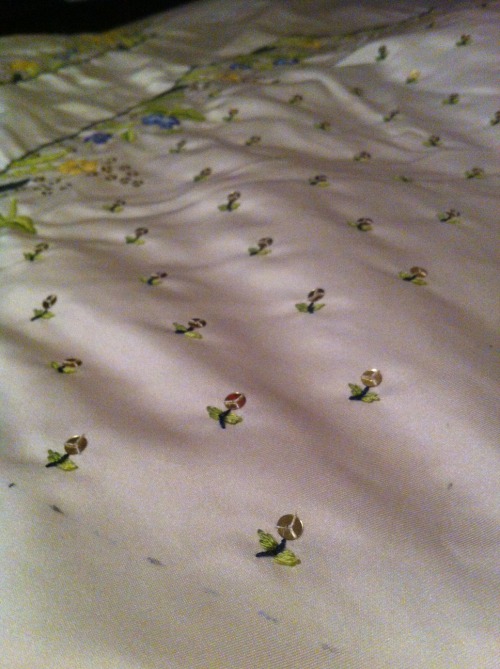Trying To Chart Out A Border Element From Embroidery In A Historical Context
Trying to chart out a border element from embroidery in a historical context

Accidentally created Godzilla instead
More Posts from Clusterfrock and Others



Started on a new fall ensemble! This amazing gown is from a Tischbein portrait from 1770! I’m halfway through the petticoat now, and will hopefully be finishing it up in the next few days.
I’m using two shot taffetas for this dress - a blue/green taffeta and a red/yellow taffeta (that looks bright orange!). Things are going a bit slowly because there is a lot of hand-sewing involved. The hem on the petticoat is 2″ deep and all had to be hand-sewn. The edges on the fabric ribbon that will become the box-pleated trim also had to be hemmed by hand, all 360 inches! It was horrible, and now it looks like I’ll have to add another length of fabric on, so that’s another 120 inches to hem! Yeesh. I’m still hoping to wrap the petticoat up by the end of the week, though!
A New Crinoline and 1850s Petticoats
Finally getting around to posting about my new 1850s undies! I finished them last winter, but Life happened, so here I am, a year and a half later.
Anyway, I finished a new crinoline and basic cotton petticoat first. The crinoline was made by first making the lower section out of cotton muslin, and attaching twill tape at even intervals. I then made each bone individually, the casing made from twill tape, then the boning threaded through, and then the bone stitched closed at the needed circumference. I played around with the size of each bone before I stitched it to the tapes to get the overall shape that I wanted.


To go over it, I made my standard cotton petticoat with a single flounce.

Then I actually got around to reading period descriptions and suggestions for petticoats in fashion magazines of the time, and found that they frequently recommended petticoats made of grosgrain fabric, with three flounces from the knee to the hem. So, I searched the internet and finally found some grosgrain fabric, which I had to order from Greece. (Spoiler alert - grosgrain and faille are pretty much indistinguishable, which I wish I'd known before because faille is way easier to find.)
Anyway, the construction of the petticoat was not difficult, but the grosgrain fabric was a nightmare. It frayed at the slightest touch, exploding into a thousand tiny shards. My serger was garbage and not working, so I used a side cutter presser foot instead, which sort of acts as a serger. It definitely helped, but by the time I discovered said presser foot, I was already so over this project that I threw it in the naughty corner for months because I couldn't stand to work on it anymore. I finally dug it out a few months later and finished it up.

I have to say, it does give an enormous amount of floof, but I would never, ever recommend making one to anyone else. It was a nightmare from start to finish.
There's a more detailed writeup with more of my petticoat research and in-progress photos on my main blog, so please do check it out!



The fill pattern on one half of the waistcoat is finished! Tonight I’ll work on the other side and the remainder of the embroidery on the second pocket flap, and hopefully have all the embroidery wrapped up by tomorrow. Then it’s on to construction!


La Mode nationale, no. 17, 25 avril 1896, Paris. Notre patron découpé (Grandeur naturelle). Corsage à pointe. Bibliothèque nationale de France
Détails et Explication du patron découpé:
Ce modèle forme pointe devant très court sur les hanches; des coques de même étoffe, doublèes de soie assortie, forment petite basque; les pinces sont ornées d'un galon brodé. (This model has a pointed front shape, very short on the hips; shells of the same fabric, lined with matching silk, form a small peplum; the clips are decorated with an embroidered braid.)
Ce patron se compose de six morceaux. (This pattern consists of six pieces.)
No. 1. — Le devant. (The front.)
No. 2. — Le premier côté; un cran indique le raccord au devant. (The first side; a notch indicates the connection at the front.)
No. 3. — Le deuxième côté; deux crans indiquent le raccord au premier côté. (The second side; two notches indicate the connection to the first side.)
No. 4. — Le jockey de la manche. (The jockey for the sleeve.)
No. 5. — Le dos, coupé long de façon à former une coque en repliant le bas à l'endroit indiqué par un cran de chaque côté. (The back, cut long so as to form a shell by folding the bottom at the place indicated by a notch on each side.)
No. 6. — La manche ballon, demi-longue; un trait à la roulette indique le dessous. (The balloon sleeve, half-length; a roulette line indicates the bottom.)
Métrage: 1m,50 tissu grande largeur; 0m,70 soie ou satin pour l'intérieur des coques.
ⓘ A sewing machine is a device that provides a several-fold increase of the speed at which you can make mistakes
Early 17thC embroidered waistcoats are some of my favorite things. ❤️ Definitely one of my *someday* projects.

Woman's jacket, English. About 1610–15, with later alterations. Linen plain weave, embroidered with metallic threads and spangles; metallic bobbin lace. The Elizabeth Day McCormick Collection.
I do not knit, but I have seriously considered learning how, exclusively so I could make one of these.
We have a surprising number of these knitted jackets in museums, most of them of Italian origin, most likely from Naples or Venice. According to the V&A, it seems that they were made in workshops as individual panels that were sold as sets that could be sewn together at home. I'm partial to the green and gold ones, like this one from the Cleveland Museum of Art.





Knitted Jacket
1600s-1690s
Italy
Knitted silk jackets were fashionable in the early 17th century as informal dress. This example is very finely knit by hand in plain silk yarn and silk partially wrapped in silver thread, in contrasting colours of blue and yellow. Characteristic of this style of jacket, it has a border of basket weave stitch and an abstract floral design worked in stocking and reverse stocking stitches. The pattern imitates the designs seen in woven silk textiles. The jacket is finely finished with the sleeves lined in silk and completed with knitted cuffs. Along each centre front, a narrow strip of linen covered in blue silk has been added, with button holes and passementerie buttons, worked in silver thread. The provenance of the jacket indicates that it is probably Italian.
Victoria & Albert Museum (Accession number: 473-1893)
Happy National Bat Day! Here’s a happy little bat embroidery pattern from the 1632 pattern book “The Schole-House for the Needle.”




The petticoat is finished! It didn't even take as long as I anticipated, even with all the hand-sewing that was involved. Everything but the long interior seams had to be hand-sewn, which was a bit of a pain, but it makes the finished skirt so much nicer looking. The next step will be to pattern out the under-bodice before starting on the levite itself. This particular dress is a little unusual, in that the under-bodice actually closes under a stomacher rather than down the center-front, which is more typical for levites and polonaises. I'm so pleased with how quickly and smoothly this project has gone so far! Of course, I haven't started on the gown itself, so we'll see if my good luck streak lasts
When I started choosing embroidery patterns for my store, I was really focused on relatively small, simple designs. Things that would be quick and easy for beginners. But honestly... I think I underestimated just how easy the printed interfacing would be, since it's the needlework version of completing a dot-to-dot patterns. They take time, but none of the constant counting and ripping stitches out.
So that meant I've started to get ambitious. Little designs are still great, but what about a few designs that are dazzling from the other side of the room? As a treat?


Maybe just one of Giovanni Ostaus's shirt opening border designs from 1561?

Some fancy chickens and um... tulips? pomegranates? water fountains?

And just for me, a pattern you won't find in any history book, a little confection I made that I like to call: "Strawberry Fieldmice Forever"

That's only like, half of them. I just dumped a whole bunch onto my Etsy.
Interested?
Beginner-friendly historical and fantasy embroidery patterns, right this way!
-
 ongoldenwings reblogged this · 2 weeks ago
ongoldenwings reblogged this · 2 weeks ago -
 bellafuga reblogged this · 3 weeks ago
bellafuga reblogged this · 3 weeks ago -
 agremlinofacatte reblogged this · 3 weeks ago
agremlinofacatte reblogged this · 3 weeks ago -
 broothpod liked this · 3 weeks ago
broothpod liked this · 3 weeks ago -
 thingsimightdo reblogged this · 1 month ago
thingsimightdo reblogged this · 1 month ago -
 greenharrow reblogged this · 1 month ago
greenharrow reblogged this · 1 month ago -
 acyndraquil reblogged this · 1 month ago
acyndraquil reblogged this · 1 month ago -
 snaxize reblogged this · 1 month ago
snaxize reblogged this · 1 month ago -
 liquidlightning liked this · 2 months ago
liquidlightning liked this · 2 months ago -
 myalignmentischaoticdumbass liked this · 2 months ago
myalignmentischaoticdumbass liked this · 2 months ago -
 betacorporation reblogged this · 2 months ago
betacorporation reblogged this · 2 months ago -
 isayoldbean liked this · 2 months ago
isayoldbean liked this · 2 months ago -
 crystalgardian reblogged this · 2 months ago
crystalgardian reblogged this · 2 months ago -
 mkcannothelpyou reblogged this · 2 months ago
mkcannothelpyou reblogged this · 2 months ago -
 ebi-chi reblogged this · 2 months ago
ebi-chi reblogged this · 2 months ago -
 bunyipchild reblogged this · 2 months ago
bunyipchild reblogged this · 2 months ago -
 heldforyears reblogged this · 2 months ago
heldforyears reblogged this · 2 months ago -
 toigar reblogged this · 2 months ago
toigar reblogged this · 2 months ago -
 dailyvituperation liked this · 2 months ago
dailyvituperation liked this · 2 months ago -
 aceitunadelmal reblogged this · 2 months ago
aceitunadelmal reblogged this · 2 months ago -
 angrylittlesliceofpizza reblogged this · 2 months ago
angrylittlesliceofpizza reblogged this · 2 months ago -
 angrylittlesliceofpizza liked this · 2 months ago
angrylittlesliceofpizza liked this · 2 months ago -
 kalikatze reblogged this · 2 months ago
kalikatze reblogged this · 2 months ago -
 kalikatze liked this · 2 months ago
kalikatze liked this · 2 months ago -
 elreinodelpurgatorio liked this · 2 months ago
elreinodelpurgatorio liked this · 2 months ago -
 rocketmanimissearth reblogged this · 2 months ago
rocketmanimissearth reblogged this · 2 months ago -
 holy-triangles reblogged this · 2 months ago
holy-triangles reblogged this · 2 months ago -
 ebi-chi liked this · 2 months ago
ebi-chi liked this · 2 months ago -
 enbean-rock liked this · 2 months ago
enbean-rock liked this · 2 months ago -
 restinperfection reblogged this · 2 months ago
restinperfection reblogged this · 2 months ago -
 samtanation liked this · 2 months ago
samtanation liked this · 2 months ago -
 zombiebrainsoup reblogged this · 2 months ago
zombiebrainsoup reblogged this · 2 months ago -
 bennybenadryl liked this · 2 months ago
bennybenadryl liked this · 2 months ago -
 katschy reblogged this · 2 months ago
katschy reblogged this · 2 months ago -
 kitkatsnow reblogged this · 2 months ago
kitkatsnow reblogged this · 2 months ago -
 moontyger reblogged this · 2 months ago
moontyger reblogged this · 2 months ago -
 sunkentowers reblogged this · 2 months ago
sunkentowers reblogged this · 2 months ago -
 literaryartisan liked this · 2 months ago
literaryartisan liked this · 2 months ago -
 ellis-peace reblogged this · 2 months ago
ellis-peace reblogged this · 2 months ago -
 unfortunatelymaggie liked this · 2 months ago
unfortunatelymaggie liked this · 2 months ago -
 wraithsonwingsposts reblogged this · 2 months ago
wraithsonwingsposts reblogged this · 2 months ago -
 anonowwl liked this · 3 months ago
anonowwl liked this · 3 months ago -
 lavosse liked this · 3 months ago
lavosse liked this · 3 months ago -
 shamelesslurker reblogged this · 3 months ago
shamelesslurker reblogged this · 3 months ago -
 shamelesslurker liked this · 3 months ago
shamelesslurker liked this · 3 months ago -
 always-blogging reblogged this · 3 months ago
always-blogging reblogged this · 3 months ago -
 always-blogging liked this · 3 months ago
always-blogging liked this · 3 months ago -
 mizza-pizza liked this · 3 months ago
mizza-pizza liked this · 3 months ago -
 ihavetitanium liked this · 3 months ago
ihavetitanium liked this · 3 months ago -
 flyingcrowbar liked this · 3 months ago
flyingcrowbar liked this · 3 months ago